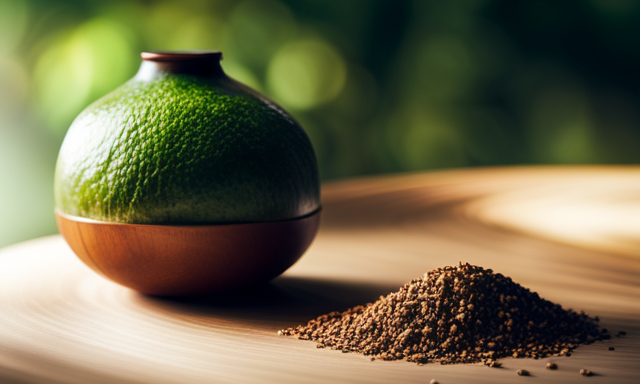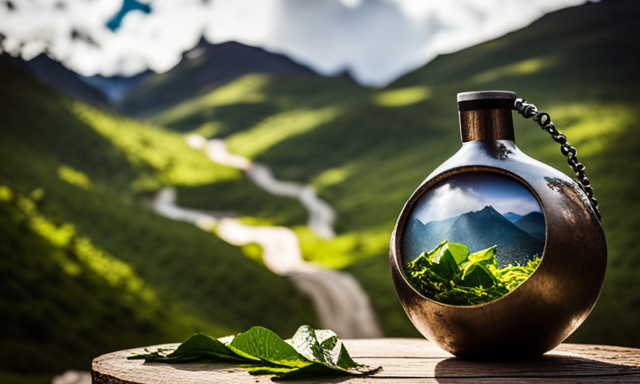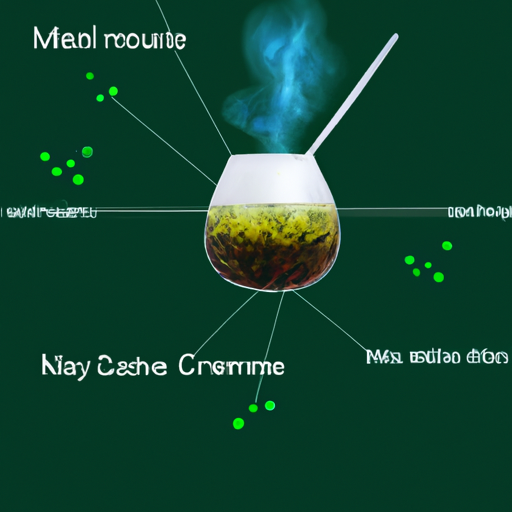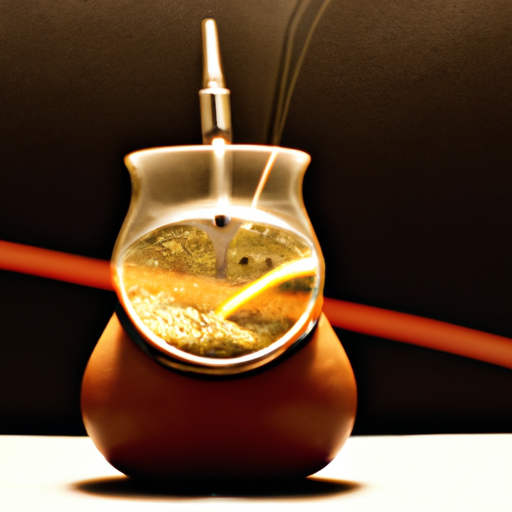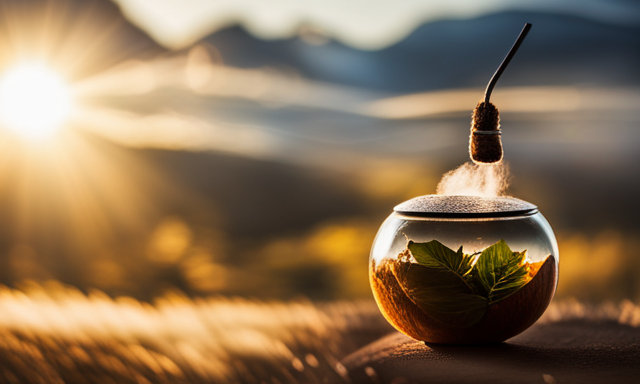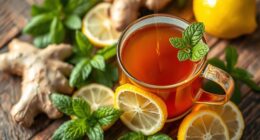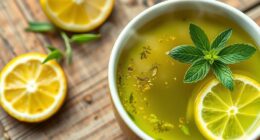Sitting here, enjoying my hot yerba mate, I ponder over its caffeine content. This revered drink from South America, known for its distinctive taste and stimulating effects, has captured hearts globally. But when it comes to its caffeine levels, how does yerba mate stack up against other beverages such as coffee or tea?
In this article, we will delve into the fascinating history and origins of yerba mate, explore its caffeine content, and uncover the potential health benefits it offers. We will also discuss the best brewing methods to extract the optimal amount of caffeine and address common myths surrounding yerba mate and its caffeine levels.
Whether you’re a coffee lover looking for a suitable alternative or simply curious about the caffeine content of yerba mate, join me on this journey as we unravel the mysteries of this invigorating drink.
Key Takeaways
- Yerba mate contains caffeine, but in smaller amounts than coffee or tea.
- The combination of caffeine, theobromine, and theophylline in yerba mate provides a balanced and sustained energy boost.
- Yerba mate is rich in antioxidants, vitamins, and minerals, offering potential health benefits such as mental focus, energy boost, digestion, immune support, and weight management.
- Yerba mate has a unique taste profile, different from coffee, with a herbaceous and earthy flavor, and it holds cultural significance as a coffee alternative, promoting social bonding and a sense of community.
The History and Origins of Yerba Mate
Yerba mate’s fascinating history and origins are just waiting to be discovered! This traditional South American beverage has a rich history that dates back centuries.
Originally consumed by indigenous Guarani people, yerba mate has deep cultural significance in countries like Argentina, Paraguay, and Uruguay. It was often used in social gatherings and played a central role in their daily routines.
The history of yerba mate is intertwined with the colonial era, as Spanish settlers recognized its value and began cultivating it on a larger scale. Over time, yerba mate gained popularity in Europe and other parts of the world, becoming a sought-after beverage.
Today, yerba mate continues to be enjoyed for its unique flavor and health benefits. It is known to provide a gentle energy boost, thanks to its natural caffeine content. Exploring the caffeine content of yerba mate opens up a whole new world of discovery for those who appreciate this ancient beverage.
Exploring the Caffeine Content of Yerba Mate
Indulging in this invigorating South American herbal infusion can transport you to a state of elevated energy, as if you’re sipping on nature’s own vitality potion. Yerba mate, a traditional drink consumed in Argentina, Paraguay, and Uruguay, contains caffeine, which contributes to its stimulating effects.
However, unlike coffee and tea, the caffeine in yerba mate is metabolized differently by the body, resulting in a more gradual release of energy and a longer-lasting effect. While the exact caffeine content of yerba mate can vary depending on factors such as brewing method and brand, it generally contains about 30-50 milligrams of caffeine per 8-ounce serving.
Comparatively, a cup of coffee typically contains around 95 milligrams of caffeine. Understanding the health benefits of yerba mate, let’s delve into its fascinating properties that make it a popular choice among many.
Understanding the Health Benefits of Yerba Mate
Delving into the health benefits of yerba mate consumption can provide a glimpse into its fascinating properties that make it a popular choice among many. This traditional South American herbal infusion is rich in antioxidants, vitamins, and minerals, which contribute to its potential health benefits.
Studies suggest that yerba mate may enhance mental focus and alertness, boost energy levels, and improve physical performance. Additionally, it’s been linked to improved digestion, immune system support, and weight management. However, it’s important to note that the research on yerba mate’s health benefits is still ongoing, and more studies are needed to fully understand its effects.
Transitioning to the subsequent section about brewing yerba mate for optimal caffeine extraction, it’s important to know the best techniques to enjoy this stimulating beverage.
How to Brew Yerba Mate for Optimal Caffeine Extraction
If you want to make the most out of your yerba mate experience, let’s dive into the art of brewing this invigorating beverage for maximum caffeine extraction. Here are four brewing techniques that will ensure you get the most caffeine out of your yerba mate:
-
Use hot, but not boiling, water: Boiling water can destroy some of the beneficial compounds in yerba mate, so it’s best to let the water cool slightly before pouring it over the leaves.
-
Steep for the right amount of time: The ideal steeping time for yerba mate is around 5 minutes. This allows enough time for the caffeine to be extracted without over-extracting the bitter flavors.
-
Stir before drinking: Give your yerba mate a good stir before taking a sip. This will help distribute the caffeine evenly throughout the beverage.
-
Use a bombilla: A bombilla is a special metal straw with a filter at the end that allows you to drink yerba mate without getting a mouthful of leaves. Using a bombilla ensures that you get the full caffeine kick without any unwanted debris.
By following these brewing techniques, you can enjoy a yerba mate that’s rich in caffeine and flavor.
Now, let’s move on to debunking common myths about yerba mate and caffeine.
Debunking Common Myths About Yerba Mate and Caffeine
Get ready to uncover the truth about the relationship between yerba mate and caffeine, and separate fact from fiction like a seasoned myth-buster.
When it comes to yerba mate, there are several misconceptions about its caffeine content that need debunking. Contrary to popular belief, yerba mate does contain caffeine, although in smaller amounts compared to coffee or tea. The average cup of yerba mate contains about 30-50 milligrams of caffeine, while a cup of coffee can have anywhere from 95-200 milligrams.
However, what sets yerba mate apart is its unique combination of caffeine, theobromine, and theophylline, which provides a more balanced and sustained energy boost without the jitters or crash often associated with coffee.
Moreover, yerba mate is deeply rooted in South American culture and holds great cultural significance, often shared among friends and family in social gatherings.
Understanding these facts about yerba mate’s caffeine content and cultural significance will help set the stage for exploring the effects of caffeine on the body and mind.
The Effects of Caffeine on the Body and Mind
Prepare to experience the invigorating surge of energy and heightened mental focus that caffeine unleashes on your body and mind. Caffeine, a central nervous system stimulant, has been widely studied for its effects on sleep and productivity. Here are four key ways caffeine impacts your body and mind:
-
Sleep: Consuming caffeine too close to bedtime can disrupt your sleep cycle, making it harder to fall asleep and stay asleep. It’s best to avoid caffeine in the evening to ensure a good night’s rest.
-
Productivity: Caffeine boosts alertness and concentration, making it a popular choice to enhance productivity. However, excessive consumption can lead to jitters and decreased focus, so moderation is key.
-
Athletic Performance: Caffeine has been shown to improve endurance and reduce perceived exertion during exercise. It can also enhance muscle strength and power, making it a beneficial supplement for athletes.
-
Recovery: Caffeine can help reduce muscle soreness and improve muscle glycogen resynthesis after intense workouts, aiding in faster recovery.
Considering these effects, it’s important to weigh the benefits and potential drawbacks when choosing yerba mate as a suitable alternative to coffee.
Is Yerba Mate a Suitable Alternative to Coffee?
Indulge in the rich flavor and energizing effects of this herbal beverage known for its ability to provide a stimulating and satisfying alternative to your morning cup of joe. Yerba mate, a traditional South American drink, offers a unique taste profile that differs from coffee. While coffee is often described as bitter or acidic, yerba mate has a more herbaceous and earthy flavor, with a hint of smokiness.
Beyond taste, yerba mate holds significant cultural significance as a coffee alternative. In South America, sharing a gourd of yerba mate is a social and bonding experience. It brings people together and fosters a sense of community. This cultural aspect adds to the appeal of yerba mate as a coffee replacement.
So, if you’re looking for a change from your usual coffee routine, consider trying yerba mate. It offers a refreshing taste and a unique cultural experience. But remember, managing caffeine intake and potential side effects is essential.
Managing Caffeine Intake and Potential Side Effects
Yerba mate has gained popularity as a suitable alternative to coffee due to its rich flavor and energizing properties. However, it’s important to manage caffeine intake and be aware of potential side effects. As a regular yerba mate drinker, I’ve learned a few strategies for balancing my caffeine consumption.
Firstly, gradually reducing caffeine intake can help manage withdrawal symptoms such as headaches and fatigue. Secondly, being mindful of the timing of yerba mate consumption can minimize its impact on sleep quality. It’s advised to avoid consuming yerba mate too close to bedtime to prevent insomnia. Additionally, practicing good sleep hygiene, such as creating a calm sleeping environment, can further support restful sleep.
By managing caffeine intake and prioritizing sleep, we can maximize the benefits of yerba mate.
Now, let’s explore different varieties and blends of yerba mate.
Exploring Different Varieties and Blends of Yerba Mate
While exploring the world of yerba mate, one can discover a diverse range of flavors and blends to suit their taste preferences. Yerba mate comes in various flavors, including traditional, fruity, and herbal blends.
Traditional yerba mate has a strong, earthy taste with a hint of bitterness, while fruity blends offer a refreshing twist with flavors like citrus, berry, or tropical fruits.
Herbal blends, on the other hand, incorporate herbs like mint, lemongrass, or chamomile for a soothing and aromatic experience. Exploring these different flavors allows you to find the perfect cup of yerba mate that matches your personal preference.
By delving into the traditions and flavors of yerba mate, you can truly appreciate the richness and diversity that this beverage has to offer. Transitioning into the conclusion, let’s now discuss how to find your perfect cup of yerba mate.
Conclusion: Finding Your Perfect Cup of Yerba Mate
Discovering the perfect blend of flavors in your cup of yerba mate will transport you on a sensory journey that will leave you longing for more. As you explore the world of yerba mate, you’ll encounter various flavor profiles that range from earthy and grassy to fruity and floral. Each variety and blend offers a unique taste experience, allowing you to find the one that resonates with your palate. Additionally, experimenting with different brewing methods can further enhance the flavors and aromas of yerba mate. Whether you prefer the traditional gourd and bombilla or a modern French press, each method brings out distinct characteristics in the brew. So go ahead, embark on the wonderful adventure of discovering your perfect cup of yerba mate and savor the diverse flavors it has to offer.
| Flavor Profiles | Brewing Methods |
|---|---|
| Earthy and grassy | Traditional gourd and bombilla |
| Fruity and floral | French press |
| Smoky and robust | Tea infuser |
| Minty and refreshing | Cold brew |
Frequently Asked Questions
Are there any potential risks or side effects associated with consuming yerba mate?
While yerba mate has potential health benefits, it’s important to be aware of potential risks. Long-term excessive consumption may lead to increased risk of certain cancers, digestive issues, and bone loss.
Can drinking yerba mate help with weight loss or boost metabolism?
Drinking yerba mate can potentially aid in weight loss and boost metabolism. Research suggests that its high antioxidant and caffeine content may increase fat oxidation and energy expenditure, supporting weight management goals.
Is yerba mate safe for pregnant women or individuals with certain medical conditions?
Yerba mate is generally safe for pregnant women and individuals with certain medical conditions. However, it’s important to consult with a healthcare professional before consuming it, especially regarding its effects on fertility and breastfeeding.
How does the caffeine content in yerba mate compare to other caffeinated beverages like coffee or tea?
Yerba mate has a caffeine content that is comparable to coffee and tea. However, it also contains other beneficial compounds like antioxidants, vitamins, and minerals, which contribute to its potential health benefits.
Are there any cultural traditions or rituals associated with drinking yerba mate?
There are cultural traditions and rituals associated with drinking yerba mate. It is a social activity in South America, where people often gather to share a gourd of mate and pass it around. It promotes a sense of community and bonding.
Conclusion
In conclusion, after exploring the history, caffeine content, and health benefits of Yerba Mate, it’s clear that this South American beverage is a suitable alternative to coffee for those looking to reduce their caffeine intake.
With an average caffeine content of 30-50 milligrams per serving, Yerba Mate provides a gentle energy boost without the jitters or crash commonly associated with coffee.
Interestingly, a study conducted by researchers found that Yerba Mate contains high levels of antioxidants, which can help protect against oxidative stress and inflammation. This statistic highlights the potential long-term health benefits of incorporating Yerba Mate into your daily routine.

